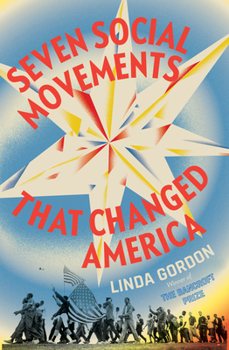Seven Social Movements That Changed America
How do social movements arise, wield power, and bring about meaningful change? Renowned scholar Linda Gordon investigates these and other salient questions in this "visionary, cautionary, timely, and utterly necessary book" (Nicole Eustace), narrating how some of America's most influential twentieth-century social movements transformed the nation.
Beginning with the turn-of-the century settlement house movement, the book compares Chicago's celebrated Hull-House, begun by privileged women, to a much less well known African American project, Cleveland's Phillis Wheatley House, begun by a former sharecropper. Expanding her highly praised book The Second Coming of the KKK, ?the second chapter shows how a?northern?Klan became a mass movement in the 1920s. Contrary to what many Klan opponents thought, this KKK was a middle-class organization, its members primarily urban and well educated. In the 1930s, the KKK gave birth to dozens of American fascist groups--small but extremely violent.?Profiles of two other 1930s movements follow: the Townsend campaign for old-age insurance, named for its charismatic leader, Dr. Francis Townsend. It created the public pressure that brought us Social Security, which was considered radical at the time, as was the movement to bring about federal unemployment aid for millions.
Proceeding to the 1955-1956 Montgomery bus boycott--which jump-started the career of Martin Luther King, Jr.--the narrative shows how the city's entire Black population refused to ride segregated buses; initiated by Black women, their years-long, hard-fought victory inspired the civil rights movement. Gordon then examines the 1970s farmworkers struggle, led by Cesar Chavez and made possible by the work of tens of thousands of the primarily Mexican American farmworkers. Together they built the United Farm Workers Union, winning better wages and working conditions for some of the country's poorest workers. The book concludes with the dramatic stories of two Boston socialist feminist groups, Bread and Roses and the Combahee River Collective, which influenced the whole women's liberation movement.
Throughout the work, Gordon concentrates not on ideologies but on how millions of grassroots activists strategized and changed the United States. Separately and together, these seven narratives bring to life the creativity and hard work of social movements, and in doing so reveal how they have been central to American history, in stories that reverberate with today's political activism.
Beginning with the turn-of-the century settlement house movement, the book compares Chicago's celebrated Hull-House, begun by privileged women, to a much less well known African American project, Cleveland's Phillis Wheatley House, begun by a former sharecropper. Expanding her highly praised book The Second Coming of the KKK, ?the second chapter shows how a?northern?Klan became a mass movement in the 1920s. Contrary to what many Klan opponents thought, this KKK was a middle-class organization, its members primarily urban and well educated. In the 1930s, the KKK gave birth to dozens of American fascist groups--small but extremely violent.?Profiles of two other 1930s movements follow: the Townsend campaign for old-age insurance, named for its charismatic leader, Dr. Francis Townsend. It created the public pressure that brought us Social Security, which was considered radical at the time, as was the movement to bring about federal unemployment aid for millions.
Proceeding to the 1955-1956 Montgomery bus boycott--which jump-started the career of Martin Luther King, Jr.--the narrative shows how the city's entire Black population refused to ride segregated buses; initiated by Black women, their years-long, hard-fought victory inspired the civil rights movement. Gordon then examines the 1970s farmworkers struggle, led by Cesar Chavez and made possible by the work of tens of thousands of the primarily Mexican American farmworkers. Together they built the United Farm Workers Union, winning better wages and working conditions for some of the country's poorest workers. The book concludes with the dramatic stories of two Boston socialist feminist groups, Bread and Roses and the Combahee River Collective, which influenced the whole women's liberation movement.
Throughout the work, Gordon concentrates not on ideologies but on how millions of grassroots activists strategized and changed the United States. Separately and together, these seven narratives bring to life the creativity and hard work of social movements, and in doing so reveal how they have been central to American history, in stories that reverberate with today's political activism.
Format:Hardcover
Language:English
ISBN:163149371X
ISBN13:9781631493713
Release Date:March 2025
Publisher:Liveright Publishing Corporation
Length:528 Pages
Customer Reviews
0 rating





